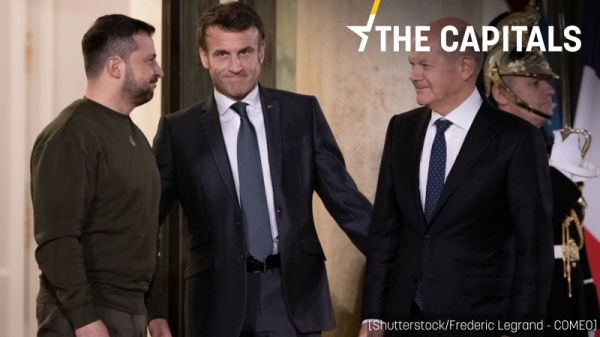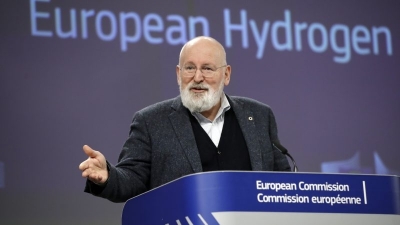‘Do more and better’: Paris hopes to align European efforts in Ukraine support

Paris will host 20 heads of state on Monday to mobilise European production capacity and explore ways better to support Ukraine in its military response to Russian aggression as the war enters its third year and troops on the ground are both outgunned and outmanned.
France’s Emmanuel Macron spearheaded the organisation of the conference on the back of signing a bilateral security deal with Ukraine’s Volodymyr Zelenskyy last week in Paris, also complemented by Germany, Canada, Denmark and Italy in the past week.
The summit is of an “extraordinary nature in a highly volatile context,” the Elysée said, looking to better align EU member states’ financial and military capacities as Russia hardens its stance against Ukraine and other Western nations.
On Saturday, the day the war entered its third year, G7 members convened online to reiterate their support for Ukraine “for as long as it takes”.
It comes amid Ukraine’s military and financial struggles at the two-year mark of Moscow’s full-scale invasion – with growing threats the US might pull out of the NATO military alliance should Republican candidate Donald Trump get elected again in November.
Some 26 nations will be represented on Monday, including 21 heads of state, such as Poland’s Andrzej Duda, Germany’s Olaf Scholz, The Netherlands’ Mark Rutte, and Spain’s Pedro Sánchez. The US and Canada will have ministerial representation, and the UK’s Foreign Secretary David Cameron will be there too.
Zelenskyy is expected to make an introductory statement by videoconference alongside Emmanuel Macron.
Cyprus, Hungary, Malta and Slovakia are expected to be absent from the summit, while Italy’s participation remains to be determined, the Elysée added.
Doing things better and differently
Zelenskyy has been warning the international community for months Ukraine is running low on ammunition and air defence systems, effectively hampering the country’s ability to push back Russian attacks.
But the EU’s promise to deliver one million ammunition rounds by spring, thanks to European financing and companies, has fallen short, and only just about half will be delivered by then.
The bloc’s top diplomat has urged EU countries to look for other ways to buy non-EU equipment.
Meanwhile, disagreements abound over whether the new EU fund for military aid for Ukraine should be spent on buying non-EU defence equipment, and reimbursement rules threaten their ability for the solidarity mechanism to support immediate needs.
France has made clear it wants to prioritise EU-made shells and weapons under the European Peace Facility (EPF), the EU’s off-budget funding mechanism used to reimburse member states for their weapons supplies to Ukraine in a move to boost the bloc’s industrial capacity – but there are concerns this would not be enough to meet Ukraine’s urgent needs.
The goal is to look to respond to both immediate and long-term strategic needs, the Elysée argued, saying Europeans “must look into doing things better and differently, so we can be more efficient and robust collectively, given every member state’s [production] capacities”.
Participants will exchange views, jointly assess the situation on the ground and see how they can adapt their joint action in fields as varied as cybersecurity, air defence, mine clearance, access to drones, and the training of Ukrainian troops, the Elysée said.
The Summit will also aim to push out a clear statement to the wider public that what’s happening in Ukraine threatens not only the sovereignty of one nation but of European stability as a whole.
Putin should have no illusions
Most Europeans support Ukraine in its war against Russia, but only one in 10 think Ukraine can win, according to a survey, with most seeing a “compromise settlement” as necessary to end the war.
“[Vladimir] Putin should be under no illusions that the EU will continue to stand behind Ukraine,” the Elysée said, denying that any growing ‘doom-and-gloom’ sentiment may be in European capitals: “We’re neither doomy nor gloomy”.
There should be no new announcements on weapon supply, however – as eyes are on Germany to unlock the delivery of long-range Taurus missiles, which Scholz has so far ruled out against his own coalition’s demands.
“It’s high time we started digging deeper into our own [national] stocks and not refrain from buying military equipment from non-EU countries,” Bernard Guetta, a Renew Europe lawmaker, told Euractiv over the weekend.
He hopes the Summit can help member states see eye to eye on new EU-wide defence funding and agree to a new round of joint debt in the medium run to support Kyiv more efficiently.
EU leaders like Emmanuel Macron, Estonia’s Kaja Kallas, and EU Commissioner for Internal Market Thierry Breton have all recently called for ‘defence eurobonds’.
“The idea is slowly making its way across EU capitals”, Guetta said.
Zelenskyy is heading to Tirana on Wednesday, where he will participate in a Ukraine- Southeastern Europe summit led by Albanian Prime Minister Edi Rama to drum up more support in the region.
(Theo Bourgery-Gonse | Euractiv.fr)
Read more with Euractiv



